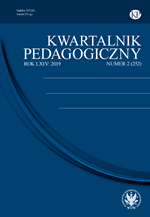Ojcostwo – w wypowiedziach dorosłych sprawców przestępstw, odbywających karę pozbawienia wolności
Fatherhood in the views of adult offenders serving a prison sentence
Author(s): Justyna SiemionowSubject(s): Social Sciences, Education, Psychology, Sociology
Published by: Wydawnictwa Uniwersytetu Warszawskiego
Keywords: fatherhood; fathers in prison; social rehabilitation process; parental relationships
Summary/Abstract: The aim of this paper is to present the results of the research on the way of understanding the meaning of parenthood/fatherhood from the perspective of prisoners. The research group has been formed with ten adult men who are under sentences in chosen penitentiary. The main goal of this research is to find the answer for the following questions: How do the prisoners identify the father’s role in their life? How do they understand their fatherhood? The decision to use an individual interview was influenced by the nature of the research and the small research sample. The attachment theory of John Bowlby (1969) and the concept of criminal thinking style by Glen David Walters (1990) – are the main theoretical assumptions of the presented article. The imprisoned men make not enough efforts to build the positive and effective relationship with their children and families. The findings also show that for the individuals included within this study imprisonment had both positive and negative effects on how they identified as parents and consequently on the relationships they were able to maintain with their children. Most of the respondents identify themselves as “good fathers”, they do not see any problems in their behavior and decisions which provide them committing different crimes. The respondents find the resources of their problems in the social environment. They completely are not able to recognise the sources of their problems in their personalities. The second theoretical issue mentioned in this paper is connected with the attachment theory. It explains how the parent–child relationship emerges and influences subsequent development. The attachment relationship acts as a prototype for all future social relationships so disrupting it can have severe consequences. The respondents cannot build emotional relationships with their children because they experienced intense distress during their childhood.
Journal: Kwartalnik Pedagogiczny
- Issue Year: 252/2019
- Issue No: 2
- Page Range: 199-218
- Page Count: 20
- Language: Polish
- Content File-PDF

